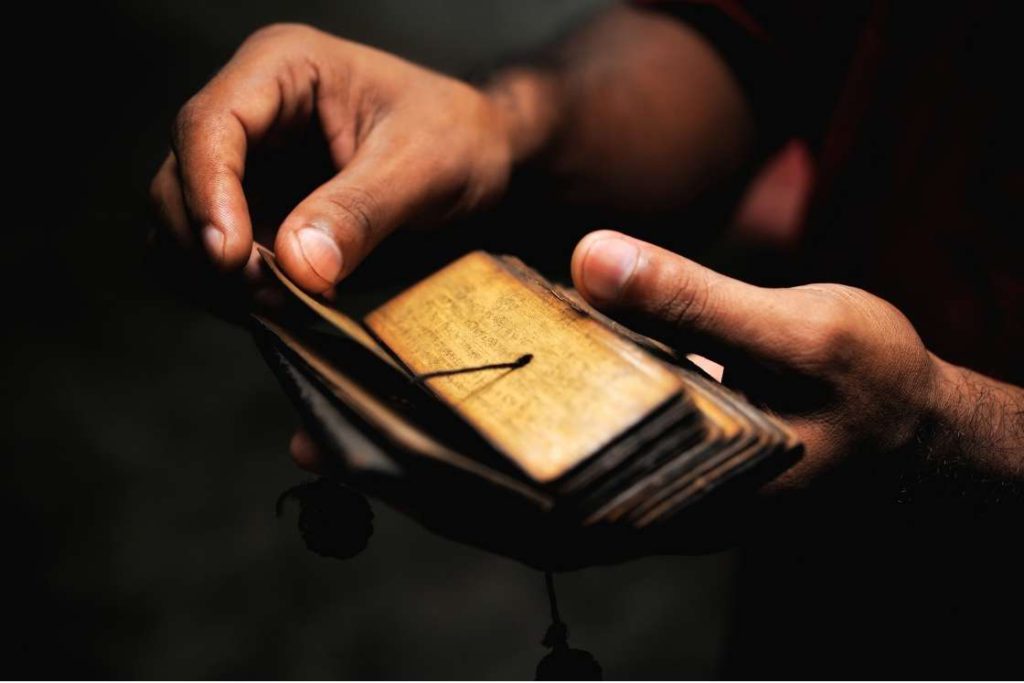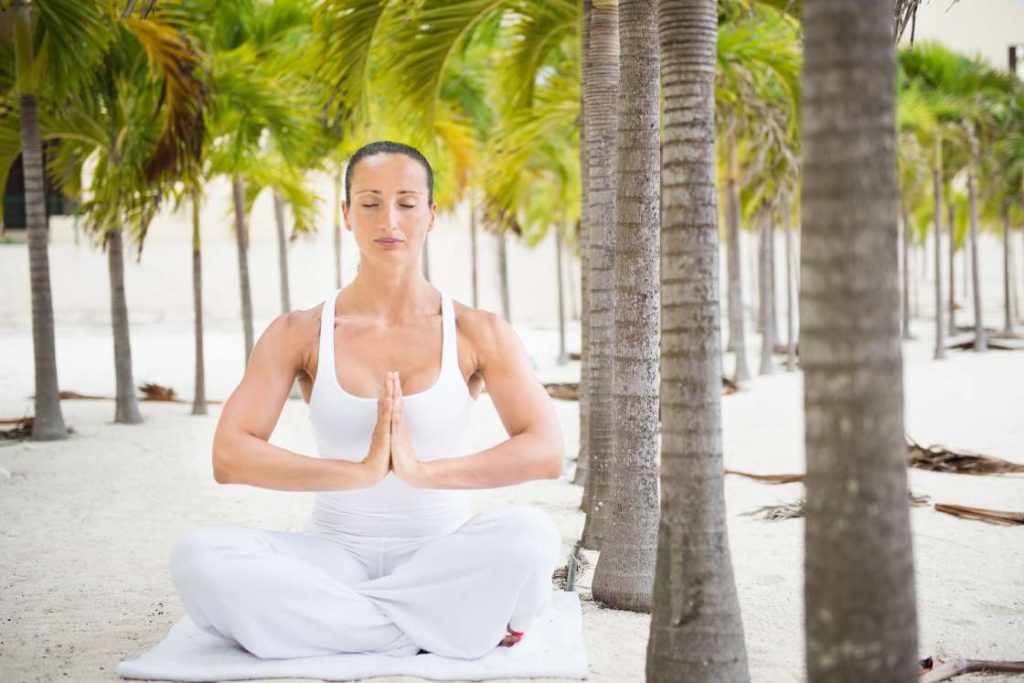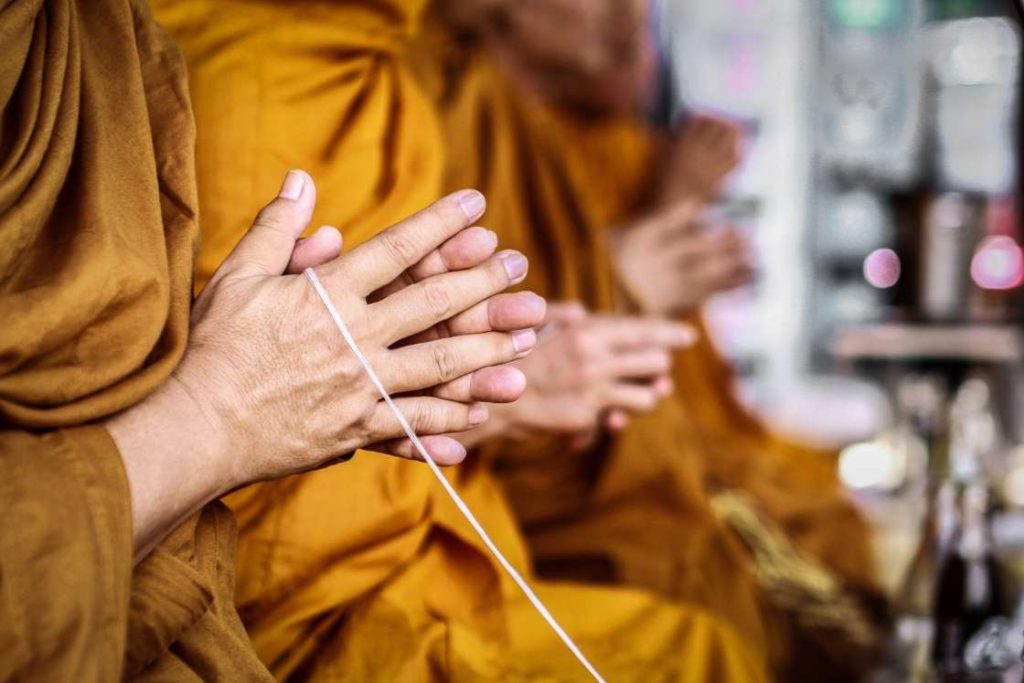Mantra Yoga is the follow of chanting sacred sounds, phrases, or verses to focus the thoughts and awaken greater consciousness. In Sanskrit, “man” means thoughts and “tra” means device or car, making the mantra a robust instrument to information psychological vitality.
By common chanting, practitioners harmonize their physique, thoughts, and spirit, cultivating inside peace, readability, and a deeper reference to the supreme consciousness.
What’s mantra yoga?
Mantra Yoga is among the six classical branches of yoga, specializing in the chanting of sacred syllables, verses, or Vedic hymns to realize inside management and better states of consciousness, notably the yoga limb of Pratyahara (withdrawal of the senses). Like all branches of yoga, its final intention is self-realisation and religious liberation.
The time period “Mantra Yoga” combines “Mantra” (a device or sound to focus the thoughts) and “Yoga” (union with the supreme consciousness). Collectively, they type a follow designed to harmonise thoughts, physique, and spirit.
By disciplined chanting and repetition, the wandering thoughts turns into regular, permitting the practitioner to deepen meditation, join with greater consciousness, and align totally with the intentions of yoga.
Origin of mantra yoga
Mantra Yoga finds its roots within the Vedas and Tantra, with its earliest teachings talked about within the Rig Veda. The truth is, some students recommend that yoga first developed via the follow of mantra chanting.
Greater than only a religious ritual, Mantra Yoga embodies a profound science handed down by the enlightened sages of Sanatana Dharma. Every mantra or hymn carries a singular vibration that resonates with common consciousness, guiding the practitioner towards inside divinity and better consciousness.
Whereas Mantra Yoga originated in Hinduism, its follow has additionally been embraced by Buddhism and Jainism as a way to realize enlightenment.
The repetition of sacred syllables or verses, referred to as Japa, deepens focus and strengthens the results of the follow. Due to this, Mantra Yoga is sometimes called Japa Yoga, highlighting the central position of constant mantra chanting in religious progress.
The weather

Mantra Yoga is incomplete with out understanding the important components of a mantra and the 16 limbs of the follow. These type the inspiration for its profitable implementation and religious advantages.
1. Components of mantra
The 5 primary necessities of a Mantra are described under that embrace Rishi (Seer), Chhanda (meter), Devta (deity), Bija (seed), and Tattva (ingredient).
- Rishi (Seer) – The seer or sage is the traditional religious trainer who found the mantra for the primary time by listening to or realizing the sounds in greater consciousness. The sage then turns into a medium who passes the mantra to additional followers on the earth.
- Chhanda (meter) – A meter is one thing that describes the pronunciation, rhythm, and the way in which of recitation to please the deity related to that mantra. Therefore each mantra is ready historically with a particular meter related to it.
- Devta (deity) – Every mantra has a particular deity presiding over it who is named upon via the chanting. The practitioner by chanting the mantra attracts and assimilates the consciousness and qualities of the presiding deity.
- Bija (seed) – Bija is an essence of the mantra which grants particular energy to it. It’s the seed of a mantra that permits the stimulation of the vitality facilities situated within the human physique. Subsequently, bija is a vital ingredient to see the fruition of the mantra.
- Tattva (ingredient) – A component is a key to unlock the supposed outcomes behind the mantra. It may be understood by the truth that each mantra possesses the character of a five-elements and certainly one of 3 gunas (comparable to Sattva, Rajas, and Tamas).
2. Limbs of mantra yoga
Identical to in Patanjali’s Yoga there 8 limbs which result in Samadhi, there are 16 limbs of Mantra yoga understanding which is crucial to get fruitful outcomes from this follow.
The 16 limbs of mantra yoga are – Bhakti, Shudhi, Asana, Panchang Sevan, Achara, Dharna, Divyadesh Sevan, Prana Kriya, Mudra, Tarpana, Havan, Bali, Yaga, Japa, Dhayana, and Samadhi.
A transparent concept describing all of the limbs are given under to make the idea simpler for the practitioner, so let’s start:
- Bhakti – The foremost facet of mantra yoga is having religion or devotion within the follow, that’s what bhakti denotes. It’s not possible to manifest mantra yoga with out having full and unshakable religion over the follow.
- Shudhi – Shudi refers to purification, which in yoga mantra means inner cleaning of physique, thoughts, and spirit. Additionally, the place devoted to the follow and the intention behind it should be pure as nicely.
- Asana – Asana refers back to the posture that the practitioner attains whereas working towards mantra yoga. It additionally denotes the seat on which the yogi sits like woolen, kusha, Resham, Mriga-charma, baghambar, blanket, and so forth. are thought-about preferable stuff to take a seat on.
- Panchang Sevan – It’s the assortment of Gita, Sahasranam, Stuti, Kavach, and Hridayanyas.
- Gita is the sacred textual content which is sung or taken excerpts from to chant.
- Sahasranam is experiencing the vastness of the supreme soul.
- Stuti refers to worshipping and associating the supreme being with the guts.
- Kavach denotes safety from the hurdles which can be achieved by sadhana.
- Hridayanyas is coming into the mysteries of the mantra via the guts.
- Achara – It exhibits the conduct of the practitioner behind the follow. It should have important ethical values and away from any dangerous affect.
- Dharana – This limb is concerning the focus of the thoughts within the current second.
- Divyadesh Sevan – It’s about growing self-identification through the follow. It’s achieved by establishing Prana Shakti (Vitality) in 16 very important factors of the physique through the yoga mantra.
- Prana Kriya – The follow of regulating the breath by getting management over inhalation, retention, and exhalation is named Prana Kriya or Pranayama.
- Mudra – It’s the hand gesture describing devotional, aesthetic, emotional, or psychic perspective whereas chanting.
- Tarpana – It represents the libation or providing particular elements, flowers, and so forth. to please the deity.
- Havan – That is the providing to the deity by burning the fireplace of Yagya, which represents feeding the lord in fireplace type. Mantra yoga can not full with out Havan.
- Bali – Bali refers to sacrifice or give up of negativity that are past management. It’s carried out by sacrificing evils like delight, lust, anger, and every other evil habits and practices.
- Yaga – This limb is about worshipping the deity wholeheartedly.
- Japa – It refers to repeated chanting of mantra as whispered, vocalized, or psychological repetitions. Usually, a Mala with 108 beads are used to maintain observe of the rounds in Japa. Japa Mala could possibly be of tulsi, rudraksha, rakta-chandan, shweta chandan, and crystal. It’s used to maintain the thoughts anchored to the follow.
- Dhyana – Greater and deeper state of focus is meditation or dhyana, Right here, it refers to picture meditation, the place the aspirant should be capable of get a glimpse of the Lord on the third eye with closed eyes.
- Samadhi (trance) – Samadhi is the state of full absorption of self with the supreme self. On this state, the practitioner realizes the everlasting self aka akhand swaroop in Sanskrit.
The way to follow mantra yoga?

To follow mantra yoga, the vital step is to attract honesty (Satya) into the follow that signifies the dedication of the practitioner.
One other factor that needs to be there earlier than beginning the mantra is to give up within the mantra which might be carried out by trusting within the follow. It’s the religion within the follow that results in the supposed outcomes which appear far past one’s potential.
After honesty and religion inside yoga mantra, the next process might be adopted to implement the follow:
- Discover a comfy place that’s away from any distractions or disturbances to follow seated meditation.
- Select your mantra after which sit quietly for a second considering your intentions with a conviction.
- Inhale deeply after which whereas exhaling recite your mantra as naturally because it rhymes with the exhalation.
- Take one other deep breath and repeat the mantra and really feel the second organically.
- On the third repetition, recollect the intention behind the actual mantra that you’re chanting.
- On the fourth repetition, it is advisable to calm down the thoughts and physique and really feel the sound of the mantra.
- On the following repetition, let the mantra occur robotically with the circulate the place you don’t utter it forcibly.
- Repeat time and again combining all the weather collectively specializing in the sound and that means of the mantra and easing your expectations.
- Preserve chanting for about 30 rounds or till you calm the thoughts throughout the follow.
- Sit in full silence for some time that you’ve got generated with the mantra cleaning the nervous system.
Alternatively, mantra yoga can be carried out in a bunch aka Sangh whereby one chief introduces the mantra to the remainder of the meeting.
Forms of chanting in mantra yoga

There are 14 sorts of chanting in Mantra Yoga, out of which three are thought-about superior or common amongst all of the practitioners, specifically, Speech Chanting (Baikhari), Low-pitched Chanting (Upanshu), and Psychological Chanting (Manasic).
Let’s have a look in any respect the 14 sorts of chanting in mantra yoga as given under:
- Speech Chanting – It’s the follow of chanting the mantra loudly to focus fully over the sutra and its resonating sound. It removes undesirable ideas, stabilizes the thoughts to succeed in meditative states, particularly useful for a newbie.
- Low-pitched Chanting – It’s a manner of mantra yoga that’s audible to the practitioner solely as the mantra is obscure that solely includes lip-movement whereas recitation.
- Psychological Chanting – Right here, the mantra is chanted silently within the thoughts with out really uttering it via the thoughts. That is normally practiced by superior or enlightened yogis.
- Nitya Japa – It’s the follow of mantra yoga which is carried out day-after-day with consistency.
- Kamya Chanting – When the yogi follow Japa yoga for the sake of their very own needs, then it’s Kamya chanting.
- Naimitik Chanting – Right here, the follow is targeted on another person’s favor or sake.
- Immovable Chanting – Because the identify clears all of it, on this kind, the sound limbs or mouth do no transfer in any respect. The mantra is recited internally and it’s practiced by bringing the physique in full stillness.
- Atonement Chanting – When mantra yoga is customized for atoning or to do away with some crime, offense, or sins that incurred to thoughts by chance, then such chanting is named atonement chanting.
- Operating Japa – That is the follow of mantra yoga the place the mantra continues whereas sitting, consuming, sleeping protecting the tongue and lips in movement. It may additionally use a garland that additionally strikes across the fingers whereas chanting.
- Akhand Chanting – On this follow, the chanting continues with none break or intervals in between.
- Ajapa Chanting – This can be a technique of working towards mantra yoga that doesn’t contain any effort, as the mantra happens in a circulate similar to respiratory. Subsequently, such chant takes place so long as there may be prana or breath within the physique.
- Bhramar chanting – Right here, the mantra chanting is completed imitating the buzzing of a bee.
- Pradakshina Chanting – Pradakshina is a sacred rotation round a temple, deity, or any sacred grove. So, the chanting that’s practiced whereas doing the pradakshina is named pradakshina chanting.
- Prohibited Chanting – When somebody intends to hurt others or chant with an impure intention that doesn’t have any rhythm or may be very intense, then it’s prohibited chanting. Such chanting is completely fruitless.
Advantages of mantra yoga
Mantra yoga is a superb follow synchronizing the physique, thoughts, and soul. Mantras which can be chanted on this follow are related to sacred powers and the hymns or vibrations have sure results on the physique’s vitality facilities, thus there are quite a few advantages arising from mantra yoga.
These assist to uplift the vitality states improves well-being and enhances the manifestation of yoga. The key advantages of mantra yoga are listed under.
- Every mantra has its personal vibration which helps in cleaning the physique internally, i.e. targets the cleaning of adverse feelings like jealousy, vanity, worry, or confusion.
- Mantra yoga is an efficient follow to harmonize the Doshas (Vatta, Pitta, and Kapha) and stimulates the circulate of Amrita (nectar of divine bliss) from crown chakra in direction of the foundation chakra.
- It will increase the sense of consciousness, focus ranges, and management over the thoughts.
- Chanting a mantra with dedication and focus helps the practitioner to soak up the qualities of the presiding deity of that specific mantra.
- Whereas working towards mantra yoga, the thoughts revolves across the hymn and the optimistic vibrations that assist in harnessing mindfulness. Thus, it helps in inculcating positivity throughout the practitioner in direction of life and the world round him.
Conclusion
Yoga mantra is your go-to follow if you wish to take your yoga into subsequent degree getting management over your thoughts. On this hectic and anxious way of life mantra yoga is a blissful and sacred follow that unlocks actual happiness, positivity, and coordinates the psychological and bodily well being.
Have religion whereas working towards mantra yoga and obtain every little thing in life experiencing the safety from the supreme soul and take your yoga journey into advance ranges.

